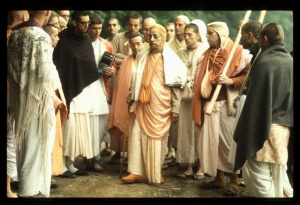SB 8.15.32: Difference between revisions
No edit summary |
(Vanibot #0054 edit - transform synonyms into clickable links, which search similar occurrences) |
||
| Line 23: | Line 23: | ||
<div class="synonyms"> | <div class="synonyms"> | ||
''evam'' | ''[//vanipedia.org/wiki/Special:VaniSearch?s=evam&tab=syno_o&ds=1 evam]'' — thus; ''[//vanipedia.org/wiki/Special:VaniSearch?s=su&tab=syno_o&ds=1 su]-[//vanipedia.org/wiki/Special:VaniSearch?s=mantrita&tab=syno_o&ds=1 mantrita]'' — being well advised; ''[//vanipedia.org/wiki/Special:VaniSearch?s=arthāḥ&tab=syno_o&ds=1 arthāḥ]'' — about duties; ''[//vanipedia.org/wiki/Special:VaniSearch?s=te&tab=syno_o&ds=1 te]'' — they (the demigods); ''[//vanipedia.org/wiki/Special:VaniSearch?s=guruṇā&tab=syno_o&ds=1 guruṇā]'' — by their spiritual master; ''[//vanipedia.org/wiki/Special:VaniSearch?s=artha&tab=syno_o&ds=1 artha]-[//vanipedia.org/wiki/Special:VaniSearch?s=anudarśinā&tab=syno_o&ds=1 anudarśinā]'' — whose instructions were quite befitting; ''[//vanipedia.org/wiki/Special:VaniSearch?s=hitvā&tab=syno_o&ds=1 hitvā]'' — giving up; ''[//vanipedia.org/wiki/Special:VaniSearch?s=tri&tab=syno_o&ds=1 tri]-[//vanipedia.org/wiki/Special:VaniSearch?s=viṣṭapam&tab=syno_o&ds=1 viṣṭapam]'' — the heavenly kingdom; ''[//vanipedia.org/wiki/Special:VaniSearch?s=jagmuḥ&tab=syno_o&ds=1 jagmuḥ]'' — went; ''[//vanipedia.org/wiki/Special:VaniSearch?s=gīrvāṇāḥ&tab=syno_o&ds=1 gīrvāṇāḥ]'' — the demigods; ''[//vanipedia.org/wiki/Special:VaniSearch?s=kāma&tab=syno_o&ds=1 kāma]-[//vanipedia.org/wiki/Special:VaniSearch?s=rūpiṇaḥ&tab=syno_o&ds=1 rūpiṇaḥ]'' — who could assume any form they liked. | ||
</div> | </div> | ||
Latest revision as of 23:18, 18 February 2024

A.C. Bhaktivedanta Swami Prabhupada
TEXT 32
- evaṁ sumantritārthās te
- guruṇārthānudarśinā
- hitvā tri-viṣṭapaṁ jagmur
- gīrvāṇāḥ kāma-rūpiṇaḥ
SYNONYMS
evam — thus; su-mantrita — being well advised; arthāḥ — about duties; te — they (the demigods); guruṇā — by their spiritual master; artha-anudarśinā — whose instructions were quite befitting; hitvā — giving up; tri-viṣṭapam — the heavenly kingdom; jagmuḥ — went; gīrvāṇāḥ — the demigods; kāma-rūpiṇaḥ — who could assume any form they liked.
TRANSLATION
Śukadeva Gosvāmī continued: The demigods, being thus advised by Bṛhaspati for their benefit, immediately accepted his words. Assuming forms according to their desire, they left the heavenly kingdom and scattered, without being observed by the demons.
PURPORT
The word kāma-rūpiṇaḥ indicates that the demigods, the inhabitants of the heavenly planets, can assume any form they desire. Thus it was not at all difficult for them to remain incognito before the eyes of the demons.